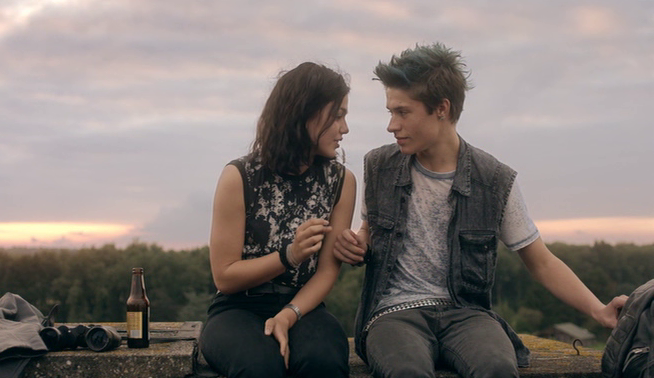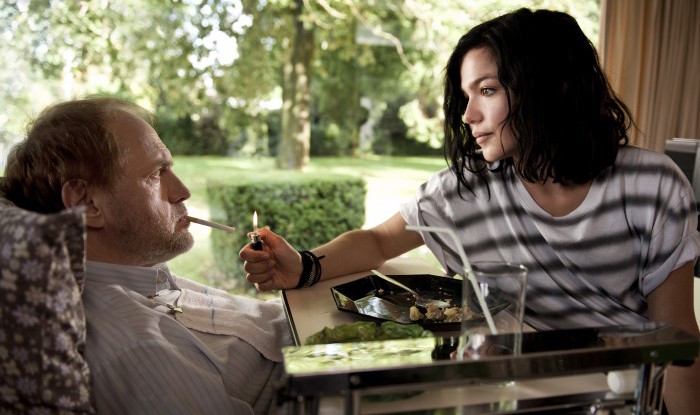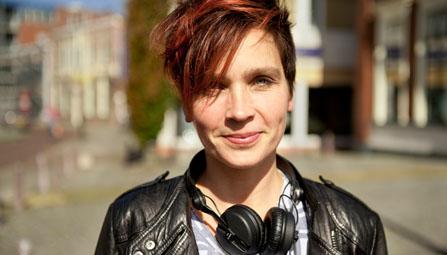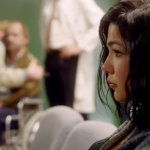Set in the Netherlands in 1989, Nena portrays a young girl struggling to cope with her own coming-of-age as well as her father’s battle with Multiple Sclerosis and his subsequent deteriorating mental state. Abbey Hoes stars as the title character and depicts a complex teenager whose suicidal father has made her both wise beyond her years and incredibly vulnerable. Based on the director’s own personal experiences, this film is passionate, tragic, and ultimately hopeful.
FilmDoo talks to Nena’s director Saskia Diesing.
Through various background radio and TV announcements, the film touches upon certain political events of the era. Why did you set the film in 1989 and what influenced your decision to include these contextual references?
1989 was a year in which the people in Europe enforced their right for self-determination, aside from ideology, politics or religion. It was a very important year for Europe and really, if you think about it, it was a miracle that no blood was shed. This intense yet peaceful turmoil was a perfect arena for the film and its central theme about self-determination. In the film these events are being presented by radio-broadcasts, far away from the intimate everyday life of Nena and her father, but it’s about the same struggle. Also, it was the year in which I graduated from school, fell in love for the first time and lost my virginity.

One particularly standout scene is Nena’s first sexual experience with Carlo, which is cut with scenes of her disabled father being assisted in everyday activities. How did this idea come about and what were you looking to achieve here?
This was one of the first scenes I wrote for the film, including the song and the intercut between the father and daughter. For me, the scene is about the painful contradiction between having sex for the first time, permitting someone else to take a look at you and your body at the most intimate and vulnerable moment, and being confronted with the fact that when you’re ill you have to hand yourself over to others who will help you in, again, vulnerable situations. It’s about surrender, but in very different and opposite ways.
Nena is an incredibly three dimensional character and she manages to seem both wise beyond her years and equally naïve and vulnerable. Where did you find inspiration for her character?
I guess it’s fair to say that, since the theme of the film is so autobiographical, it’s my own youth. But Nena is a lot braver than me.
In terms of Nena’s suicidal father, the film does not try to find redemption in a sudden conversion and desire to live, rather it comes to terms with the desire to die. Why did you decide to explore this topic?
When I was just 12-years-old, my father, who was like Martin in the film, severely ill with Multiple Sclerosis, told me that he could no longer stand living and wanted to kill himself. At the time I could barely comprehend the idea of committing suicide when there was so much to live for. The film is not strictly autobiographical but the conversation I had with my father is the source. He eventually died when I was 14-years-old and you could say that because I couldn’t help him then I’m trying to help him posthumously.

What was the motivation behind the ‘either/or’ questions that Nena engages in with both her father and her boyfriend?
In one of my first short films the characters played this game, and I thought it’s a nice way to tell something about a character in a very short space of time. Of course we had to also use it in one of the the important scenes in which Nena asks her father about the best way to commit suicide. In this way, an innocent game becomes an existential talk about life and death.
Are you currently working on any new films?
Yes, I just finished my second feature film Dorst (Craving), which is a book adaptation of Ester Gerritsen’s novel Dorst. I wrote it together with Esther, who was also the co-author of Nena.
Watch Nena on FilmDoo now!
Featured image from Film Krant/Nadine Maas





